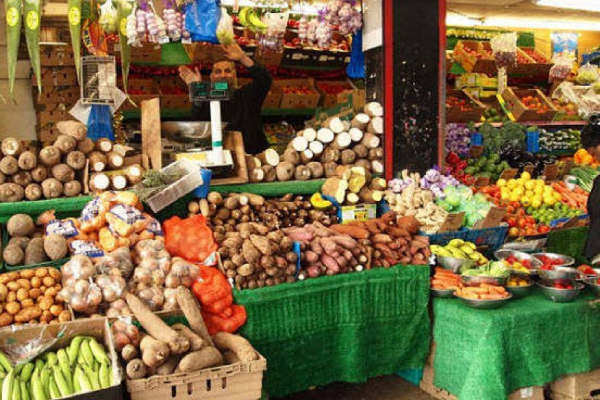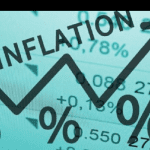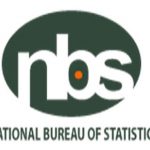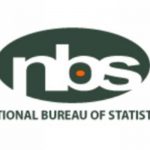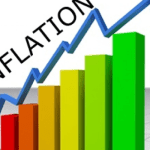According to the National Bureau of Statistics’ (NBS) new Consumer Price Index (CPI) report, Nigeria’s CPI increased by 20.77% year on year in September 2022. The index increased by 1.36% month on month, compared to 1.77% increase in the previous month.
This represents the highest rate since September 2005, according to data tracked by Nairalytics, a web portal that publishes Nigeria’s historical macroeconomic data.
[wonderplugin_video iframe=”https://youtu.be/_p8789Ssk3A” lightbox=0 lightboxsize=1 lightboxwidth=960 lightboxheight=540 autoopen=0 autoopendelay=0 autoclose=0 lightboxtitle=”” lightboxgroup=”” lightboxshownavigation=0 showimage=”” lightboxoptions=”” videowidth=600 videoheight=400 keepaspectratio=1 autoplay=0 loop=0 videocss=”position:relative;display:block;background-color:#000;overflow:hidden;max-width:100%;margin:0 auto;” playbutton=”https://www.tvcnews.tv/wp-content/plugins/wonderplugin-video-embed/engine/playvideo-64-64-0.png”]
Meanwhile, the urban inflation rate stood at 21.25% in September 2022 from 17.19% recorded in the corresponding period of 2021, while rural inflation stood at 20.32%.
The food inflation rate in September 2022 was 23.34% on a year-on-year basis, marking an uptick from the 23.12% recorded in the previous month. The increase in the food index was attributed to increases in prices of bread and cereals, food products, potatoes, yams, and other tubers, oil, and fat.
The ‘’all items less farm produce’’ or core inflation, which excludes the prices of volatile agricultural produce, stood at 17.60% in September 2022 on a year-on-year basis; up from 17.2% recorded in August 2022.
The highest increases were recorded in prices of gas, liquid fuel, passenger transport by air, passenger travel by road, and solid fuel.
According to the National Bureau of Statistics’ (NBS) new Consumer Price Index (CPI) report, Nigeria’s CPI increased by 20.77% year on year in September 2022. The index increased by 1.36% month on month, compared to 1.77% increase in the previous month.
This represents the highest rate since September 2005, according to data tracked by Nairalytics, a web portal that publishes Nigeria’s historical macroeconomic data.
[wonderplugin_video iframe=”https://youtu.be/_p8789Ssk3A” lightbox=0 lightboxsize=1 lightboxwidth=960 lightboxheight=540 autoopen=0 autoopendelay=0 autoclose=0 lightboxtitle=”” lightboxgroup=”” lightboxshownavigation=0 showimage=”” lightboxoptions=”” videowidth=600 videoheight=400 keepaspectratio=1 autoplay=0 loop=0 videocss=”position:relative;display:block;background-color:#000;overflow:hidden;max-width:100%;margin:0 auto;” playbutton=”https://www.tvcnews.tv/wp-content/plugins/wonderplugin-video-embed/engine/playvideo-64-64-0.png”]
Meanwhile, the urban inflation rate stood at 21.25% in September 2022 from 17.19% recorded in the corresponding period of 2021, while rural inflation stood at 20.32%.
The food inflation rate in September 2022 was 23.34% on a year-on-year basis, marking an uptick from the 23.12% recorded in the previous month. The increase in the food index was attributed to increases in prices of bread and cereals, food products, potatoes, yams, and other tubers, oil, and fat.
The ‘’all items less farm produce’’ or core inflation, which excludes the prices of volatile agricultural produce, stood at 17.60% in September 2022 on a year-on-year basis; up from 17.2% recorded in August 2022.
The highest increases were recorded in prices of gas, liquid fuel, passenger transport by air, passenger travel by road, and solid fuel.
According to the National Bureau of Statistics’ (NBS) new Consumer Price Index (CPI) report, Nigeria’s CPI increased by 20.77% year on year in September 2022. The index increased by 1.36% month on month, compared to 1.77% increase in the previous month.
This represents the highest rate since September 2005, according to data tracked by Nairalytics, a web portal that publishes Nigeria’s historical macroeconomic data.
[wonderplugin_video iframe=”https://youtu.be/_p8789Ssk3A” lightbox=0 lightboxsize=1 lightboxwidth=960 lightboxheight=540 autoopen=0 autoopendelay=0 autoclose=0 lightboxtitle=”” lightboxgroup=”” lightboxshownavigation=0 showimage=”” lightboxoptions=”” videowidth=600 videoheight=400 keepaspectratio=1 autoplay=0 loop=0 videocss=”position:relative;display:block;background-color:#000;overflow:hidden;max-width:100%;margin:0 auto;” playbutton=”https://www.tvcnews.tv/wp-content/plugins/wonderplugin-video-embed/engine/playvideo-64-64-0.png”]
Meanwhile, the urban inflation rate stood at 21.25% in September 2022 from 17.19% recorded in the corresponding period of 2021, while rural inflation stood at 20.32%.
The food inflation rate in September 2022 was 23.34% on a year-on-year basis, marking an uptick from the 23.12% recorded in the previous month. The increase in the food index was attributed to increases in prices of bread and cereals, food products, potatoes, yams, and other tubers, oil, and fat.
The ‘’all items less farm produce’’ or core inflation, which excludes the prices of volatile agricultural produce, stood at 17.60% in September 2022 on a year-on-year basis; up from 17.2% recorded in August 2022.
The highest increases were recorded in prices of gas, liquid fuel, passenger transport by air, passenger travel by road, and solid fuel.
According to the National Bureau of Statistics’ (NBS) new Consumer Price Index (CPI) report, Nigeria’s CPI increased by 20.77% year on year in September 2022. The index increased by 1.36% month on month, compared to 1.77% increase in the previous month.
This represents the highest rate since September 2005, according to data tracked by Nairalytics, a web portal that publishes Nigeria’s historical macroeconomic data.
[wonderplugin_video iframe=”https://youtu.be/_p8789Ssk3A” lightbox=0 lightboxsize=1 lightboxwidth=960 lightboxheight=540 autoopen=0 autoopendelay=0 autoclose=0 lightboxtitle=”” lightboxgroup=”” lightboxshownavigation=0 showimage=”” lightboxoptions=”” videowidth=600 videoheight=400 keepaspectratio=1 autoplay=0 loop=0 videocss=”position:relative;display:block;background-color:#000;overflow:hidden;max-width:100%;margin:0 auto;” playbutton=”https://www.tvcnews.tv/wp-content/plugins/wonderplugin-video-embed/engine/playvideo-64-64-0.png”]
Meanwhile, the urban inflation rate stood at 21.25% in September 2022 from 17.19% recorded in the corresponding period of 2021, while rural inflation stood at 20.32%.
The food inflation rate in September 2022 was 23.34% on a year-on-year basis, marking an uptick from the 23.12% recorded in the previous month. The increase in the food index was attributed to increases in prices of bread and cereals, food products, potatoes, yams, and other tubers, oil, and fat.
The ‘’all items less farm produce’’ or core inflation, which excludes the prices of volatile agricultural produce, stood at 17.60% in September 2022 on a year-on-year basis; up from 17.2% recorded in August 2022.
The highest increases were recorded in prices of gas, liquid fuel, passenger transport by air, passenger travel by road, and solid fuel.
According to the National Bureau of Statistics’ (NBS) new Consumer Price Index (CPI) report, Nigeria’s CPI increased by 20.77% year on year in September 2022. The index increased by 1.36% month on month, compared to 1.77% increase in the previous month.
This represents the highest rate since September 2005, according to data tracked by Nairalytics, a web portal that publishes Nigeria’s historical macroeconomic data.
[wonderplugin_video iframe=”https://youtu.be/_p8789Ssk3A” lightbox=0 lightboxsize=1 lightboxwidth=960 lightboxheight=540 autoopen=0 autoopendelay=0 autoclose=0 lightboxtitle=”” lightboxgroup=”” lightboxshownavigation=0 showimage=”” lightboxoptions=”” videowidth=600 videoheight=400 keepaspectratio=1 autoplay=0 loop=0 videocss=”position:relative;display:block;background-color:#000;overflow:hidden;max-width:100%;margin:0 auto;” playbutton=”https://www.tvcnews.tv/wp-content/plugins/wonderplugin-video-embed/engine/playvideo-64-64-0.png”]
Meanwhile, the urban inflation rate stood at 21.25% in September 2022 from 17.19% recorded in the corresponding period of 2021, while rural inflation stood at 20.32%.
The food inflation rate in September 2022 was 23.34% on a year-on-year basis, marking an uptick from the 23.12% recorded in the previous month. The increase in the food index was attributed to increases in prices of bread and cereals, food products, potatoes, yams, and other tubers, oil, and fat.
The ‘’all items less farm produce’’ or core inflation, which excludes the prices of volatile agricultural produce, stood at 17.60% in September 2022 on a year-on-year basis; up from 17.2% recorded in August 2022.
The highest increases were recorded in prices of gas, liquid fuel, passenger transport by air, passenger travel by road, and solid fuel.
According to the National Bureau of Statistics’ (NBS) new Consumer Price Index (CPI) report, Nigeria’s CPI increased by 20.77% year on year in September 2022. The index increased by 1.36% month on month, compared to 1.77% increase in the previous month.
This represents the highest rate since September 2005, according to data tracked by Nairalytics, a web portal that publishes Nigeria’s historical macroeconomic data.
[wonderplugin_video iframe=”https://youtu.be/_p8789Ssk3A” lightbox=0 lightboxsize=1 lightboxwidth=960 lightboxheight=540 autoopen=0 autoopendelay=0 autoclose=0 lightboxtitle=”” lightboxgroup=”” lightboxshownavigation=0 showimage=”” lightboxoptions=”” videowidth=600 videoheight=400 keepaspectratio=1 autoplay=0 loop=0 videocss=”position:relative;display:block;background-color:#000;overflow:hidden;max-width:100%;margin:0 auto;” playbutton=”https://www.tvcnews.tv/wp-content/plugins/wonderplugin-video-embed/engine/playvideo-64-64-0.png”]
Meanwhile, the urban inflation rate stood at 21.25% in September 2022 from 17.19% recorded in the corresponding period of 2021, while rural inflation stood at 20.32%.
The food inflation rate in September 2022 was 23.34% on a year-on-year basis, marking an uptick from the 23.12% recorded in the previous month. The increase in the food index was attributed to increases in prices of bread and cereals, food products, potatoes, yams, and other tubers, oil, and fat.
The ‘’all items less farm produce’’ or core inflation, which excludes the prices of volatile agricultural produce, stood at 17.60% in September 2022 on a year-on-year basis; up from 17.2% recorded in August 2022.
The highest increases were recorded in prices of gas, liquid fuel, passenger transport by air, passenger travel by road, and solid fuel.
According to the National Bureau of Statistics’ (NBS) new Consumer Price Index (CPI) report, Nigeria’s CPI increased by 20.77% year on year in September 2022. The index increased by 1.36% month on month, compared to 1.77% increase in the previous month.
This represents the highest rate since September 2005, according to data tracked by Nairalytics, a web portal that publishes Nigeria’s historical macroeconomic data.
[wonderplugin_video iframe=”https://youtu.be/_p8789Ssk3A” lightbox=0 lightboxsize=1 lightboxwidth=960 lightboxheight=540 autoopen=0 autoopendelay=0 autoclose=0 lightboxtitle=”” lightboxgroup=”” lightboxshownavigation=0 showimage=”” lightboxoptions=”” videowidth=600 videoheight=400 keepaspectratio=1 autoplay=0 loop=0 videocss=”position:relative;display:block;background-color:#000;overflow:hidden;max-width:100%;margin:0 auto;” playbutton=”https://www.tvcnews.tv/wp-content/plugins/wonderplugin-video-embed/engine/playvideo-64-64-0.png”]
Meanwhile, the urban inflation rate stood at 21.25% in September 2022 from 17.19% recorded in the corresponding period of 2021, while rural inflation stood at 20.32%.
The food inflation rate in September 2022 was 23.34% on a year-on-year basis, marking an uptick from the 23.12% recorded in the previous month. The increase in the food index was attributed to increases in prices of bread and cereals, food products, potatoes, yams, and other tubers, oil, and fat.
The ‘’all items less farm produce’’ or core inflation, which excludes the prices of volatile agricultural produce, stood at 17.60% in September 2022 on a year-on-year basis; up from 17.2% recorded in August 2022.
The highest increases were recorded in prices of gas, liquid fuel, passenger transport by air, passenger travel by road, and solid fuel.
According to the National Bureau of Statistics’ (NBS) new Consumer Price Index (CPI) report, Nigeria’s CPI increased by 20.77% year on year in September 2022. The index increased by 1.36% month on month, compared to 1.77% increase in the previous month.
This represents the highest rate since September 2005, according to data tracked by Nairalytics, a web portal that publishes Nigeria’s historical macroeconomic data.
[wonderplugin_video iframe=”https://youtu.be/_p8789Ssk3A” lightbox=0 lightboxsize=1 lightboxwidth=960 lightboxheight=540 autoopen=0 autoopendelay=0 autoclose=0 lightboxtitle=”” lightboxgroup=”” lightboxshownavigation=0 showimage=”” lightboxoptions=”” videowidth=600 videoheight=400 keepaspectratio=1 autoplay=0 loop=0 videocss=”position:relative;display:block;background-color:#000;overflow:hidden;max-width:100%;margin:0 auto;” playbutton=”https://www.tvcnews.tv/wp-content/plugins/wonderplugin-video-embed/engine/playvideo-64-64-0.png”]
Meanwhile, the urban inflation rate stood at 21.25% in September 2022 from 17.19% recorded in the corresponding period of 2021, while rural inflation stood at 20.32%.
The food inflation rate in September 2022 was 23.34% on a year-on-year basis, marking an uptick from the 23.12% recorded in the previous month. The increase in the food index was attributed to increases in prices of bread and cereals, food products, potatoes, yams, and other tubers, oil, and fat.
The ‘’all items less farm produce’’ or core inflation, which excludes the prices of volatile agricultural produce, stood at 17.60% in September 2022 on a year-on-year basis; up from 17.2% recorded in August 2022.
The highest increases were recorded in prices of gas, liquid fuel, passenger transport by air, passenger travel by road, and solid fuel.

